Women with disabilities sue Detroit, county, Michigan for government building violations
After years of pushing for disability rights and easier access to restrooms in Detroit's Coleman A. Young Municipal Center, several women have taken their fight to court.
Jill Babcock and Ashley Jacobson, each with physical disabilities, said they have made multiple attempts to get local and state government officials to renovate their buildings with disability-friendly features, such as accessible restrooms open to the public, larger stalls and wider doorways and paths. But the two say they have been largely ignored. Frustrated, they filed a class action lawsuit on Dec. 6, 2022, in federal court in Detroit, claiming disability rights violations by the state of Michigan, Wayne County, city of Detroit, Wayne County Building Authority, Detroit Building Authority and Detroit-Wayne Joint Building Authority.
The plaintiffs are seeking immediate changes to interior, particularly unlocking restroom doors to the public and renovating them to help users with mobility devices easily navigate them, in the Coleman A. Young Municipal Center. They also seek automatic door openers and steel protectors on glass doors that may hit wheelchairs. Other issues include making exterior changes, such as addressing "poorly designed ramps and curb cuts," properly placed rails and sidewalk structure, according to the complaint.
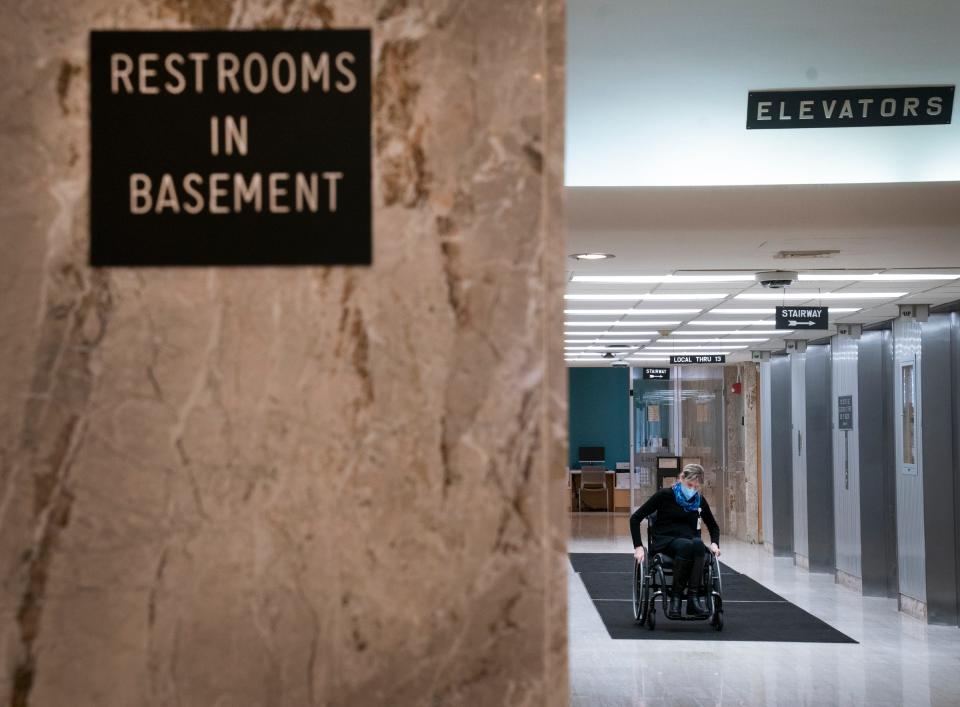
“The immediate thing to do is get those public bathrooms open to the public. The second thing is to start removing the inaccessible bathrooms and replacing them with accessible toilets and stalls. That’s going to be a major project, but it needs to get started,” said Michael Bartnik, the Bloomfield Hills-based attorney with Law For Baby Boomers PLLC, who is representing them.
The plaintiffs are also seeking compensatory damages for economic losses, emotional distress, humiliation, embarrassment, delay, and inconvenience, according to the lawsuit.
Bartnik said he had tried to negotiate for changes with the agencies on behalf of the plaintiffs before the pandemic, and again in 2021 and 2022. But the effort was shut down in April 2022 without explanation, he said. Jamie Junior, who was crowned "Ms. Wheelchair of Michigan" was a plaintiff but dropped out to focus on her advocacy, Bartnik added. Another plaintiff is expected to join the class action, he said.
Sharon Banks, Detroit-Wayne Joint Building Authority spokesperson, said the necessary measures were taken to ensure compliance with the Americans with Disabilities Act, a 1990 federal law that requires design accommodations, such as wider doorways and ramps, in public buildings for people with disabilities.
“Two years ago, the Detroit-Wayne Joint Building Authority engaged an engineering firm to help with an ADA review to identify where the Coleman A. Young Municipal Center is compliant, and where there may be areas for improvement. The Authority consistently reviews the recommendations and has been proactively addressing ADA issues," Banks said in an email to the Free Press. "The priority is to facilitate ease of building access for City of Detroit and Wayne County residents, and other visitors.”
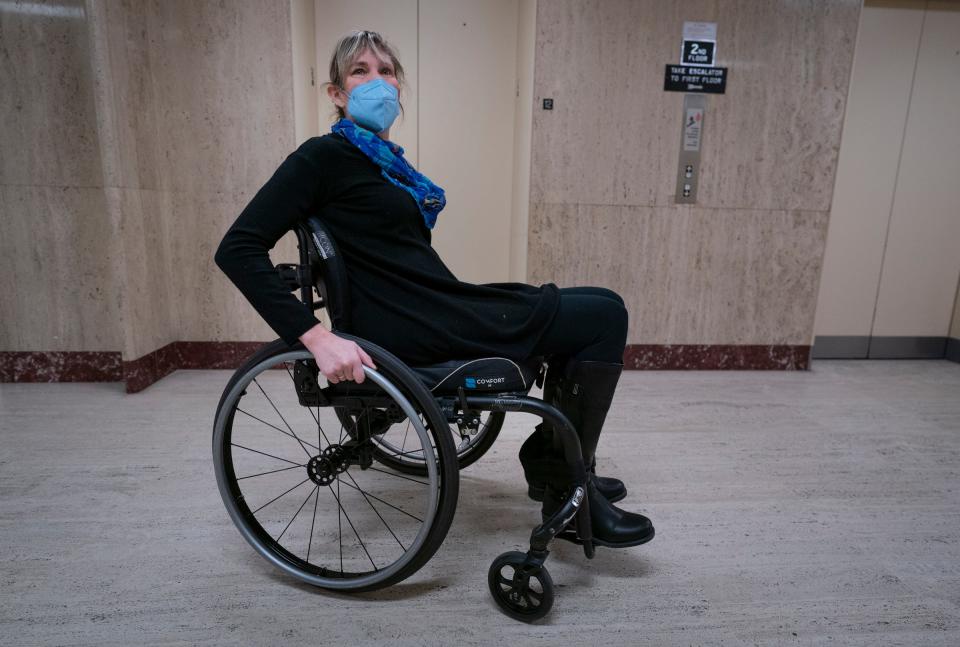
During Babcock’s first week as a city of Detroit employee, she sat down with an ADA coordinator requesting access to a bathroom on her floor. Babcock has ataxia, a neurological disorder affecting her strength, agility, balance and motor skills, which requires her to use a wheelchair and have immediate access to a restroom to avoid injury, according to the lawsuit.
Babcock, a program analyst for the city’s Housing and Revitalization Department, said she often had to trek down the elevator to the basement of City Hall to use the restroom because her floor was without an accessible stall nearby.
Frustrations ensued for Babcock, 51, of Detroit, who sent what she called a “heinous” email to the mayor's office in August 2019 asking for accessible restrooms.
Prior to the onset of the COVID-19 pandemic, Babcock would work in her ninth floor office five days a week. Now, she works inside City Hall maybe twice a month, she said. Beyond the bathrooms, Babcock faces other difficulties getting around the building, such as when using elevators or opening doors.
"It turns out, the elevators themselves are not timed appropriately. It usually takes me a couple elevators till I actually get one close enough that I make it inside before it closes," Babcock said. "I can go in my suite. And they had talked about making an accessible door, but that was three years ago. Luckily, I never held my breath. It’s still a heavy push-door and I just ram it with my chair. I just run right into and it kind of push it."
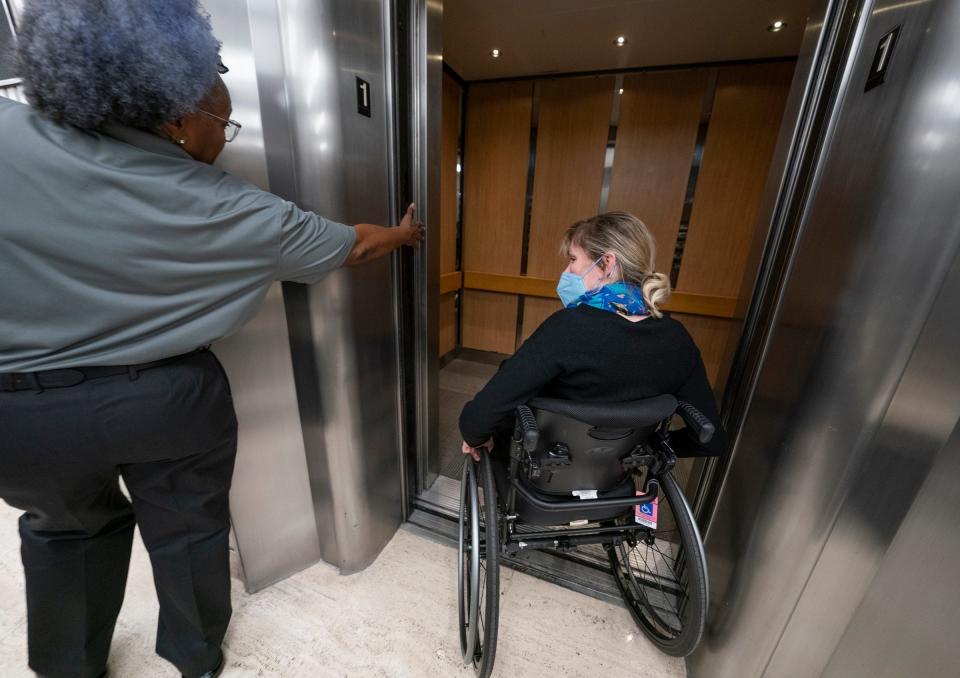
The lawsuit also cites buildings in Delta, Ingham, Kent, Livingston, Mackinac, Macomb, Oakland and Washtenaw counties for similar violations.
Jacobson, a disability rights attorney who works on cases throughout Michigan, relies on her crystal-clear cane to maneuver the halls. Jacobson, 34, was diagnosed with systemic lupus erythematosus, interstitial cystitis and endometriosis. The conditions affect her strength, balance, varying restroom needs, dexterity, motor skills and her ability to stand for long periods of time, which requires using a cane or wheelchair.
“For a period of time when I started to get clients in (Detroit), I’d scope out all the courthouses for where my clients are going to be and for a period of time, the only accessible restroom was in the basement in a dark corner. And even then, if you're in a wheelchair, which I'm not today but I have been before, you can't reach the soap dispensers. It's just a mess,” Jacobson said.
The Ann Arbor-based attorney uses an implanted medical device and catheters, causing her to make adjustments throughout the day. Having a private space, such as a restroom, is necessary for that, Jacobson said.
“Being able to use restroom equipment in some of these bathrooms is just impossible when there's not an accessible restroom stall. Some of the restrooms, they didn't have railings to be able to balance yourself,” Jacobson said. “And the doors to the restrooms are very heavy.”
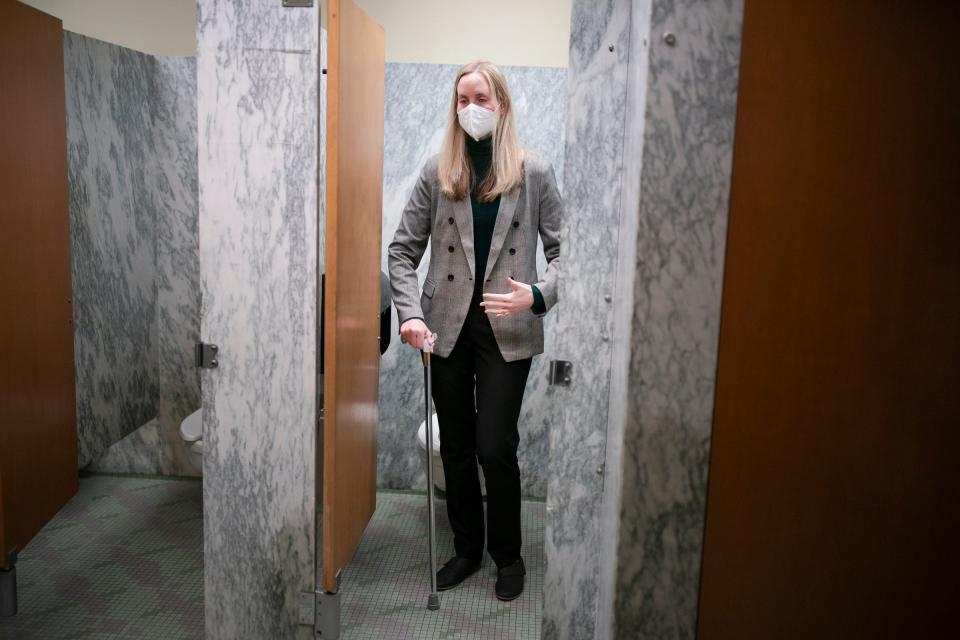
A greater challenge for Jacobson is limiting her in-person practice on days when her condition flares up, she said. But when physically present, Jacobson often heads up several floors to reach the courtrooms of the Wayne County side of the Coleman A. Young Municipal Center.
“If I need to use the restroom, I need to allocate at least 10 to 15 minutes to just get to a restroom,” Jacobson said, adding that she is often given a hard time when requesting virtual hearings because of her medical condition and has been out of luck in getting a response from ADA coordinators.
“It's really important to have quick access because your case could be called in five minutes or an hour,” she added.
Her job also includes having side conversations with clients outside of the courtroom, where she has to walk to the end of the hallway and slowly take a few steps down a set of stairs with her cane to avoid disrupting judges or clients in other cases. She has asked for things like moving cases virtually or access to a closer bathroom to ease the experience for nonemployees but said administrators viewed it as “demanding special treatment.”
“It's very difficult for people to have total empathy for it until they've gone through it themselves. Which I also understand because I wasn't born with a disability. I acquired it when I was around 20 and I was actually very athletic. I was a competitive figure skater and I ran a half marathon,” Jacobson said.
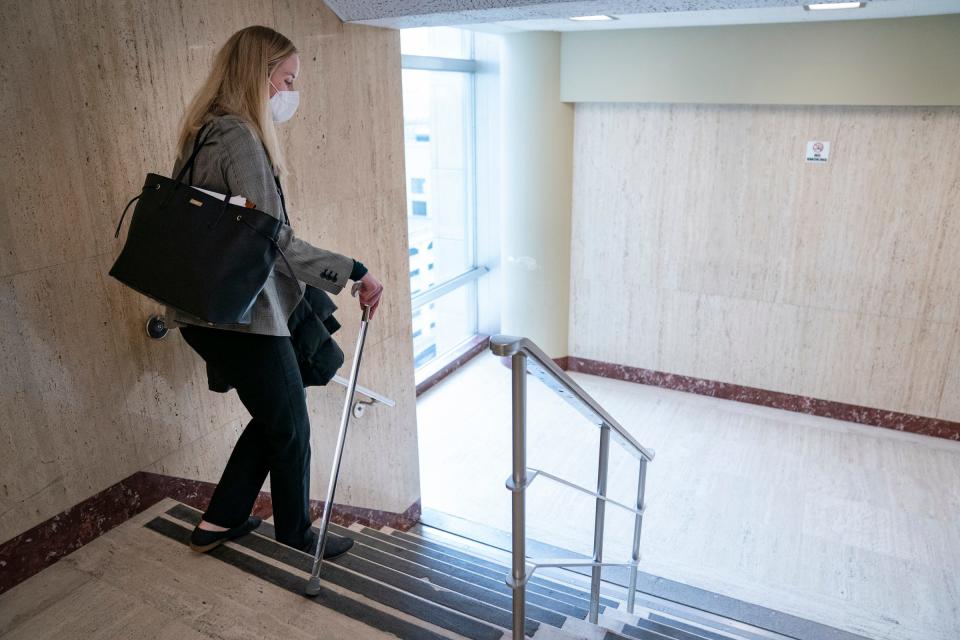
The two are asking for more accountability from government agencies.
"These are examples of the way the state, county and city have systematically ignored these civil rights laws. They don’t even acknowledge people with disabilities and the impact these illegal actions have on everything that they cause. It’s ridiculous. So we’re hoping this lawsuit actually brings to the forefront of recognition that there are people with disabilities out there and they deserve protection," Babcock said.
Bartnik said a class-action lawsuit is the way change happens in the disability rights field.
"Unfortunately, the way to get things done is to file a case in court so the parties can get together (and) work out an agreement," Bartnik said. "All of these buildings need to be brought up to code and they're legally required to do so as I read the cases and laws. This is what we want as citizens, as members of the public. This is what we want from our government."
Dana Afana is the Detroit city hall reporter for the Free Press. Contact: dafana@freepress.com or 313-635-3491. Follow her on Twitter: @DanaAfana
This article originally appeared on Detroit Free Press: Disability rights advocates file suit against Detroit, state

